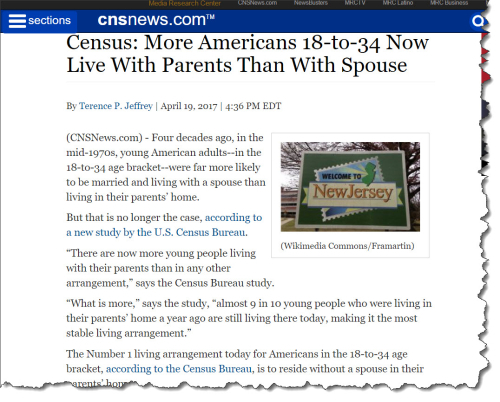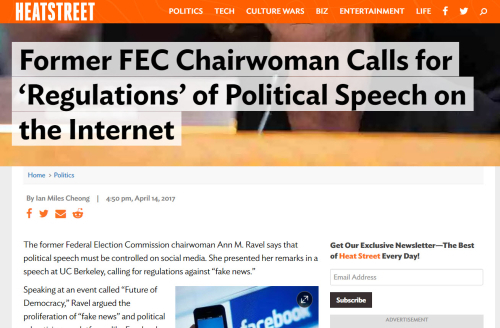James L. Paris's Blog, page 91
April 24, 2017
The Downward Spiral Of Scientology
Journalist and blogger, Tony Ortega, joins Jim Paris Live. On this Scientology special, Jim shares his own experience of spending 24 hours in Clearwater on the Scientology campus, the visitors center, and participating a four hour training. Also discussed was Scientology's failed bid to acquire more downtown real estate in Clearwater, the plan for Tom Cruise to move to Clearwater, the next season of Leah Remini's Scientology series, and the strange atmosphere created in downtown Clearwater by Scientology's massive footprint.
Noted Secular Humanist Suggests Sex Assaults on Mentally Disabled Are Not So Harmful
In 2015, a so-called ���ethicist��� at Rutgers University by the name of Anna Stubblefield was convicted of sexual assault and handed a 12-year prison sentence. She was accused of assaulting a 30-year-old man with cerebral palsy, one whose condition is severe enough that he has never uttered a word in his life, and requires care for even the most basic of personal needs.
Stubblefield had initially crossed paths with the victim, known only as ���D.J.,��� in a therapeutic setting, helping him to make some progress in his ability to communicate through a computer keyboard. Eventually, Stubblefield came to make a shocking revelation to D.J.���s family that the pair were ���in love,��� and it was learned that Stubblefield had engaged in sexual intercourse with the man. Considering the obvious characteristics of each of the principals involved, a jury in New Jersey decided Stubblefield was guilty of aggravated sexual assault.
Now, as detailed in a piece over at Life News, another noted ���ethicist,��� Peter Singer, has come to the aid of Stubblefield in the form of an op-ed over at The New York Times, declaring her prison sentence to be much too harsh. It is, however, the specific basis for this belief that may well curl your hair.
Writing with still another ethicist, Jeff McMahan, Singer says, in part, ���If we assume that he [the victim] is profoundly cognitively impaired, we should concede that he cannot understand the normal significance of sexual relations between persons or the meaning and significance of sexual violation. In that case, he is incapable of giving or withholding informed consent������
In other words, the mentally challenged essentially cannot be victims of sexual assault, even as they have been sexually violated, because their handicap does not allow them to understand the nature of what has happened.
You���d think, with all of these ethicists, there might be some actual ethics at play here.
Apparently not.
By Robert G. Yetman, Jr. Editor At Large
U.S. Census Bureau: More Americans Age 18 to 34 Living with Parents than with a Spouse
It appears that we are very much headed in the wrong direction, in some of the most profound of ways.
Another disturbing example to that effect: The results of a new study completed by the U.S. Census Bureau, and reported by CNSNews.com, that reveals American adults who occupy the 18-to-34 age bracket are now more likely to be living with parents than with a spouse.
It was not always this way. In the 1970���s, Americans within that same age range were much more likely to be married and living with their husbands or wives.
Not anymore.
As a matter of fact, according to the Census Bureau, living at home with parents is the most common living arrangement of any for the demographic at issue.
The trend in the opposite direction is not merely one that stands out by comparison to 1970���s standards; note this comment from the Census Bureau���s report:
���In 2005, the majority of young adults lived independently in their own household, which was the predominant living arrangement in 35 states. A decade later, by 2015, the number of states where the majority of young people lived independently fell to just six.���
Even more ominous is the number of adults in this age bracket who are not only living at home, but aren���t doing much of anything productive:
���Of young people living in their parents��� home,��� the Census Bureau���s report goes on to say, ���1 in 4 are idle, that is they neither go to school nor work. This figure represents about 2.2 million 25- to 34-year-olds.���
Look out below.
By Robert G. Yetman, Jr. Editor At Large
April 23, 2017
Career Prospects Can Be Greatly Magnified by Learning Spanish
Do you know a foreign language? If not, have you ever wanted to learn to communicate in another language?
If so, it may have been something you thought you might do for fun, or because you hope to travel to another country one day, and desire to communicate in the native tongue.
Now, though, there���s a different reason for learning a foreign language, one that���s pretty compelling: You can greatly increase your professional prospects by doing so.
An article over at SI (Study International) News outlines the high points of this line of thinking, including that ���those who speak multiple languages ��� particularly Spanish, Mandarin or Arabic ��� have a much better chance of finding meaningful employment.��� The piece goes on to say that ���as more business leaders and corporations reach out to global audiences and markets, the importance of knowing another language comes in handy������
Not mentioned specifically in the article, but something Americans know very well, is the increasing acceptability of Spanish in the workplace throughout the U.S. With well over 40 million native Spanish speakers now in the country, along with another 12 million-plus who are bilingual, there are now more people who speak Spanish living in the United States than there are in either Colombia or Spain! Given the enormous number of residents in America who speak Spanish, there is no question that language will continue to increase its influence over the nation���s work culture.
In light of all of this, if you���re someone who has wondered if perhaps it might be time to pick up some conversational Spanish, then a terrific program called Rocket Spanish might be just the ticket for you.
Rocket Spanish comes positively packed with resources to get you well on your way to speaking the language with great fluency. Depending on which program level you select, you will receive up to 370 hours of total lesson time, up to nearly 200 sets of digital flash cards, as well as a ton of other benefits, including 24/7 forum and email support and 24/7 lifetime access. Additionally, if you would like to receive the product in the form of high-quality CD���s, you have that option, as well.
On top of ALL of this, Rocket Spanish comes with a 60-day money-back guarantee. This means you have two months to use the full resources of the Rocket Spanish program to be certain it���s for you. If, at any time during those 60 days, you decide you would like your money back, simply request a refund.
Learning a foreign language has always been a good idea, but, for many people, learning select languages���including Spanish���is practically becoming a necessity. If you see yourself as one whose professional prospects could be greatly enhanced by learning to converse in Spanish, then, by all means, take a closer look at the super-comprehensive Rocket Spanish program today.
By Robert G. Yetman, Jr. Editor At Large
Study: Higher Minimum Wage Requirements Wiping Out Less-Trendy Restaurants
Once again, those persnickety laws of economics are getting in the way of social engineering.
An article over at the Washington Examiner brings attention to the results of a recent study done by none other than Harvard Business School, one that reveals higher mandatory minimum wages do, indeed, exert a profoundly negative effect on the very businesses required to pay those earnings.
Specifically, the research examined the impact of San Francisco���s acutely high minimum wage on local restaurants. Although the federal minimum wage is $7.25, and California���s statewide minimum wage requirement is presently $10.50, San Francisco, in all of its social justice wisdom, requires the businesses there to pay a wage of no less than $13.00 an hour.
The result? More and more restaurants in the city are shuttering their doors because they simply cannot afford to pay the rate. What���s more, the restaurants being forced to close are not among the high-end establishments, but, rather, those with lower ratings.
According to the study���s authors, Dara Lee and Michael Luca, ���The impact on exit is concentrated among lower quality restaurants, which are already closer to the margin of exit. This suggests that the ability of firms to adjust to minimum wage changes could differ depending on firm quality.���
As for the matter of the broad effect of the city���s high minimum wage, Lee and Luca say that it ���increases overall exit rates among restaurants, where a $1 increase in the minimum wage leads to approximately a 4 to 10 percent increase in the likelihood of exit.���
Unsurprisingly, but somewhat ironically, higher-quality restaurants seem able to weather the minimum wage storm OK. The study found that five-star restaurants (as determined by the Yelp social media review platform) managed to successfully work around it, but those with three-and-a-half-star ratings were 14 percent more likely to go under when the minimum wage increased 10 percent above the state���s mandated minimum wage.
So the more marginal you are, the greater your chances you���ll be wiped out altogether.
Doesn���t sound very social justice-y, does it?
By Robert G. Yetman, Jr. Editor At Large
April 21, 2017
Jim Paris Coming To Dallas And Houston
What Does It Take to Be a Millionaire? Financial Modesty, for One Thing
An article over at the popular ecommerce site Shopify reveals seven traits that millionaires tend to have in common. When you see them (and you would do well to read the full article embedded here), none will likely shock you, but there may be one or two that you will see as perhaps being a little surprising.
One of the more interesting characteristics noted in the piece pertains to spending habits. Many tend to instinctively think of millionaires as people who are jetting all over the world, spending on lavish vacations, and engaging in other, related behaviors like buying expensive cars and regularly eating in the best restaurants.
Except nothing could be further from the truth.
Millionaires, in fact, tend to be very modest when it comes to how they spend their dough. Among the statistics to that effect cited in the article (which come from The Millionaire Mind, a terrific book by Thomas J. Stanley) is one that says half of the American millionaire population have not paid over $399 for a suit, and over half haven���t paid more than $30,000 for a car. Now, while it has to be clarified that these are rather dated statistics - The Millionaire Mind was published all the way back in 2000 ��� the message is clear: Millionaires tend not to spend a whole lot of money.
Feel pretty good about this already, don���t you? After all, for lots of us, financial modesty has long been a way of life.
The point is that despite how they tend to be portrayed by the media, most millionaires are regular people for whom the work, the challenge of succeeding in business���.is the juice.
In fact, you may well find, after reading the article, that you have quite a bit in common with the ���average millionaire.���
Maybe not everything, but perhaps enough; enough to become one yourself.
By Robert G. Yetman, Jr. Editor At Large
Sportswriter Deems Flag-Waving by Sports Teams an Act of Political Expression
The social narrative of late informs us that the patriotic displays we all used to think of as pretty generic are now tantamount to expressions of specific political ideals.
 Of course, the demonization of garden-variety patriotism is the work of our pals on the left. We���re all familiar with NFL quarterback Colin Kaepernick���s decision to kneel during the playing of the national anthem before football games. To Kaepernick and his ideological brethren, the national anthem is not simply that; it is an expression of ideology, and thus something with which to take issue.
Of course, the demonization of garden-variety patriotism is the work of our pals on the left. We���re all familiar with NFL quarterback Colin Kaepernick���s decision to kneel during the playing of the national anthem before football games. To Kaepernick and his ideological brethren, the national anthem is not simply that; it is an expression of ideology, and thus something with which to take issue.
The Super Bowl champion New England Patriots visited the White House this week, and a great many members of the team chose to pass on the trip. Why? Because now, anyone who has achieved any level of notoriety and goes to the White House is declaring that he or she is in lockstep with the policies of its occupant, and those who disagree with those policies don���t want to be seen as making such a declaration.
Along these same lines, Craig Calcaterra, a baseball writer for NBC Sports, decided to take issue this past weekend with the Atlanta Braves for unfurling an enormous American flag as a part of the presentation of the national anthem before the start of the game.
In a twitter post that included a photo of the massive flag, Calcaterra snidely wrote, ���Will you keep politics out of sports, please? We like sports to be politics-free.��� He was being sarcastically critical of the display, suggesting that a pro sports team displaying an American flag like that is ���political.���
Not simply patriotic; but political.
Because nowadays, everything is.
By Robert G. Yetman, Jr. Editor At large
April 20, 2017
Former Chairwoman of FEC Says Political Speech on the Internet Should Be Regulated
There was a time in this country���and it was not all that long ago���when everyone, regardless of ideology, would absolutely cringe at the thought of regulating political speech.
Beyond the obvious speech protections enshrined in the First Amendment to the U.S. Constitution, the simple notion that people should be able to speak their minds, particularly when it comes to political matters, is as ingrained in the historical fabric of America as much as anything is.
Sadly, however, that view of speech and political thought within our borders is very much in jeopardy. For one thing, there are the frequent surveys about which we now read that indicate younger folks, in particular, seem perfectly fine with putting legal limits on expressions they view as offensive.
Unfortunately, such misguided notions are not merely the province of the youthfully exuberant. As it happens, even older Americans ��� some of whom, by virtue of their professional experience, should clearly know better -seem quite comfortable with limiting political discourse.
Case in point: Former Federal Election Commission (FEC) chairwoman Ann M. Ravel, who called for such limitations during a speech she gave recently at UC Berkeley (where else?), according to the news site Heat Street.
���We know that there���s a lot of campaigning that���s moved to the internet, whether it���s through fake news or just outright advertising and there is almost no regulation of this, very little,��� she griped. ���And so that the disclosure that we expect as to who is behind campaigns is not going to exist soon.���
Ravel appeared to be reiterating her previously-voiced objections to political speech in alternative forums, something that is clearly a pet concern of hers. Previously, she had called for so-called ���alt-right��� sites to be subject to ���regulation,��� and said, as well, that internet-based political activities rightly fall under the ���purview��� of the FEC.
By Robert G. Yetman, Jr. Editor At Large
Diversity Training at Clemson University Declares It���s Racist to Expect People to Show Up on Time
No, this isn���t downright stupid or anything.
Courtesy of the folks over at The Daily Caller, we have learned that Clemson University has gone all-in on diversity training for its professors, setting aside nearly $27,000 for related training materials.
That may be an eye-opener, in and of itself, for some people, but what has really left some aghast is just what sort of lessons this information seeks to impart.
To set the stage, note that the training materials, such as they are, consist of slides that show fictional scenarios designed to be instructive.
In one such scenario, a character by the name of ���Alejandro��� is coordinating a meeting between two groups of people. One group shows up on time, while the other is late, by 10 minutes. In each case, the group is comprised of various foreign college professors and students.
Now, per the slides, it would be wrong for Alejandro to ���politely ask the second group to apologize��� for being late. Instead, according to the $27,000 training materials, Alejandro needs to ���recognize cultural differences that may impact the meeting and adjust accordingly,��� and that he must be aware ���that his cultural perspective regarding time is neither more nor less valid than any other.���
In other words, it would be racist for Alejandro���and any real-world Alejandro���to expect any foreign group members to show up on time; or, at the very least, it would be racist for Alejandro to be critical of their lateness.
This is the kind of lunacy that 27 thousand bucks buys at Clemson University.
By Robert G. Yetman, Jr. Editor At Large












